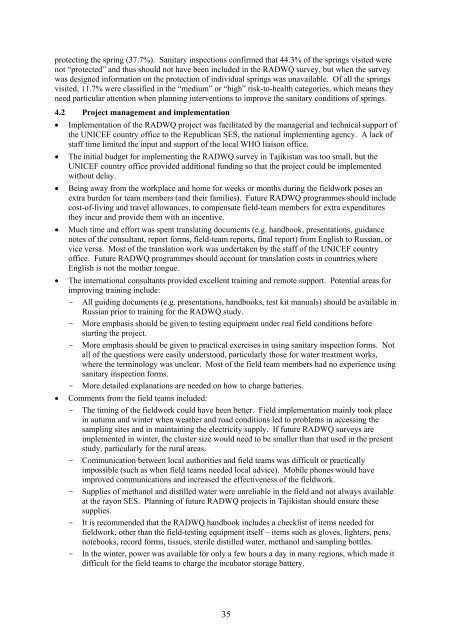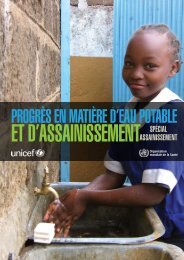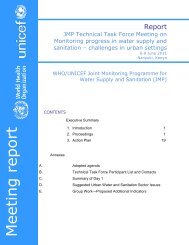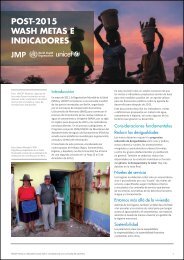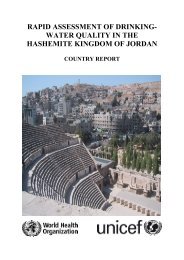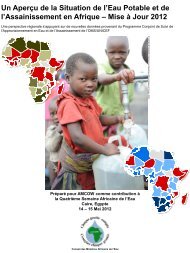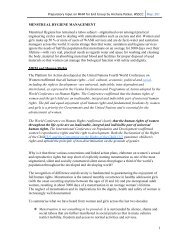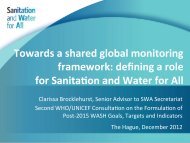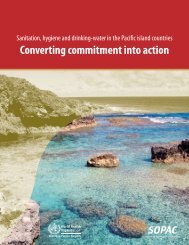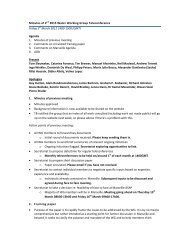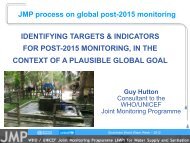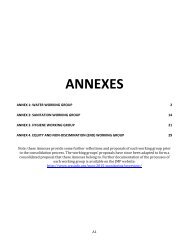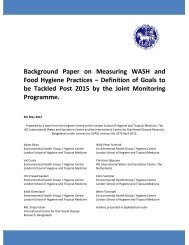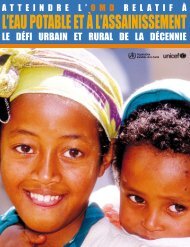rapid assessment of drinking-water quality in the republic of tajikistan
rapid assessment of drinking-water quality in the republic of tajikistan
rapid assessment of drinking-water quality in the republic of tajikistan
You also want an ePaper? Increase the reach of your titles
YUMPU automatically turns print PDFs into web optimized ePapers that Google loves.
protect<strong>in</strong>g <strong>the</strong> spr<strong>in</strong>g (37.7%). Sanitary <strong>in</strong>spections confirmed that 44.3% <strong>of</strong> <strong>the</strong> spr<strong>in</strong>gs visited were<br />
not “protected” and thus should not have been <strong>in</strong>cluded <strong>in</strong> <strong>the</strong> RADWQ survey, but when <strong>the</strong> survey<br />
was designed <strong>in</strong>formation on <strong>the</strong> protection <strong>of</strong> <strong>in</strong>dividual spr<strong>in</strong>gs was unavailable. Of all <strong>the</strong> spr<strong>in</strong>gs<br />
visited, 11.7% were classified <strong>in</strong> <strong>the</strong> “medium” or “high” risk-to-health categories, which means <strong>the</strong>y<br />
need particular attention when plann<strong>in</strong>g <strong>in</strong>terventions to improve <strong>the</strong> sanitary conditions <strong>of</strong> spr<strong>in</strong>gs.<br />
4.2 Project management and implementation<br />
Implementation <strong>of</strong> <strong>the</strong> RADWQ project was facilitated by <strong>the</strong> managerial and technical support <strong>of</strong><br />
<strong>the</strong> UNICEF country <strong>of</strong>fice to <strong>the</strong> Republican SES, <strong>the</strong> national implement<strong>in</strong>g agency. A lack <strong>of</strong><br />
staff time limited <strong>the</strong> <strong>in</strong>put and support <strong>of</strong> <strong>the</strong> local WHO liaison <strong>of</strong>fice.<br />
The <strong>in</strong>itial budget for implement<strong>in</strong>g <strong>the</strong> RADWQ survey <strong>in</strong> Tajikistan was too small, but <strong>the</strong><br />
UNICEF country <strong>of</strong>fice provided additional fund<strong>in</strong>g so that <strong>the</strong> project could be implemented<br />
without delay.<br />
Be<strong>in</strong>g away from <strong>the</strong> workplace and home for weeks or months dur<strong>in</strong>g <strong>the</strong> fieldwork poses an<br />
extra burden for team members (and <strong>the</strong>ir families). Future RADWQ programmes should <strong>in</strong>clude<br />
cost-<strong>of</strong>-liv<strong>in</strong>g and travel allowances, to compensate field-team members for extra expenditures<br />
<strong>the</strong>y <strong>in</strong>cur and provide <strong>the</strong>m with an <strong>in</strong>centive.<br />
Much time and effort was spent translat<strong>in</strong>g documents (e.g. handbook, presentations, guidance<br />
notes <strong>of</strong> <strong>the</strong> consultant, report forms, field-team reports, f<strong>in</strong>al report) from English to Russian, or<br />
vice versa. Most <strong>of</strong> <strong>the</strong> translation work was undertaken by <strong>the</strong> staff <strong>of</strong> <strong>the</strong> UNICEF country<br />
<strong>of</strong>fice. Future RADWQ programmes should account for translation costs <strong>in</strong> countries where<br />
English is not <strong>the</strong> mo<strong>the</strong>r tongue.<br />
The <strong>in</strong>ternational consultants provided excellent tra<strong>in</strong><strong>in</strong>g and remote support. Potential areas for<br />
improv<strong>in</strong>g tra<strong>in</strong><strong>in</strong>g <strong>in</strong>clude:<br />
- All guid<strong>in</strong>g documents (e.g. presentations, handbooks, test kit manuals) should be available <strong>in</strong><br />
Russian prior to tra<strong>in</strong><strong>in</strong>g for <strong>the</strong> RADWQ study.<br />
- More emphasis should be given to test<strong>in</strong>g equipment under real field conditions before<br />
start<strong>in</strong>g <strong>the</strong> project.<br />
- More emphasis should be given to practical exercises <strong>in</strong> us<strong>in</strong>g sanitary <strong>in</strong>spection forms. Not<br />
all <strong>of</strong> <strong>the</strong> questions were easily understood, particularly those for <strong>water</strong> treatment works,<br />
where <strong>the</strong> term<strong>in</strong>ology was unclear. Most <strong>of</strong> <strong>the</strong> field team members had no experience us<strong>in</strong>g<br />
sanitary <strong>in</strong>spection forms.<br />
- More detailed explanations are needed on how to charge batteries.<br />
Comments from <strong>the</strong> field teams <strong>in</strong>cluded:<br />
- The tim<strong>in</strong>g <strong>of</strong> <strong>the</strong> fieldwork could have been better. Field implementation ma<strong>in</strong>ly took place<br />
<strong>in</strong> autumn and w<strong>in</strong>ter when wea<strong>the</strong>r and road conditions led to problems <strong>in</strong> access<strong>in</strong>g <strong>the</strong><br />
sampl<strong>in</strong>g sites and <strong>in</strong> ma<strong>in</strong>ta<strong>in</strong><strong>in</strong>g <strong>the</strong> electricity supply. If future RADWQ surveys are<br />
implemented <strong>in</strong> w<strong>in</strong>ter, <strong>the</strong> cluster size would need to be smaller than that used <strong>in</strong> <strong>the</strong> present<br />
study, particularly for <strong>the</strong> rural areas.<br />
- Communication between local authorities and field teams was difficult or practically<br />
impossible (such as when field teams needed local advice). Mobile phones would have<br />
improved communications and <strong>in</strong>creased <strong>the</strong> effectiveness <strong>of</strong> <strong>the</strong> fieldwork.<br />
- Supplies <strong>of</strong> methanol and distilled <strong>water</strong> were unreliable <strong>in</strong> <strong>the</strong> field and not always available<br />
at <strong>the</strong> rayon SES. Plann<strong>in</strong>g <strong>of</strong> future RADWQ projects <strong>in</strong> Tajikistan should ensure <strong>the</strong>se<br />
supplies.<br />
- It is recommended that <strong>the</strong> RADWQ handbook <strong>in</strong>cludes a checklist <strong>of</strong> items needed for<br />
fieldwork, o<strong>the</strong>r than <strong>the</strong> field-test<strong>in</strong>g equipment itself – items such as gloves, lighters, pens,<br />
notebooks, record forms, tissues, sterile distilled <strong>water</strong>, methanol and sampl<strong>in</strong>g bottles.<br />
- In <strong>the</strong> w<strong>in</strong>ter, power was available for only a few hours a day <strong>in</strong> many regions, which made it<br />
difficult for <strong>the</strong> field teams to charge <strong>the</strong> <strong>in</strong>cubator storage battery.<br />
35


